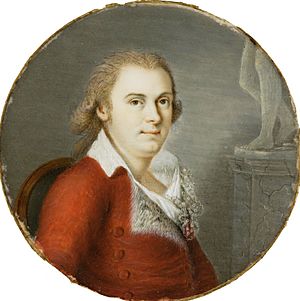Mariano Luis de Urquijo facts for kids
Quick facts for kids
The Most Excellent
Mariano Luis de Urquijo
|
|
|---|---|
 |
|
| Prime Minister of Spain | |
| In office 12 February 1799 – 13 December 1799 |
|
| Monarch | Charles IV |
| Preceded by | Francisco Saavedra de Sangronis |
| Succeeded by | Pedro Cevallos |
| Personal details | |
| Born |
Mariano Luis de Urquijo y Muga
September 8, 1769 Bilbao, Spain |
| Died | May 3, 1817 (aged 47) Paris, France |
| Resting place | Père Lachaise Cemetery |
Mariano Luis de Urquijo y Muga (born in Bilbao, Spain in 1769 – died in Paris, France, in 1817) was an important Spanish politician. He served as the top minister, known as the Secretary of State or Prime Minister, for King Charles IV of Spain from 1799 to 1800. He also held this powerful role again from 1808 to 1813 under King Joseph Bonaparte.
Contents
Life and Early Career
Mariano Luis de Urquijo was born into a noble family from the Basque region of Spain. He studied law in the cities of Madrid and Salamanca. After his studies, he lived for some time in Ireland.
Joining the Government
Urquijo later joined the Spanish government's foreign service. He was helped by important figures like the Count of Aranda and the Count of Floridablanca. In 1792, he became a high-ranking officer in the Secretary of State's office. This was a very important position in the government.
Progressive Ideas
Urquijo had modern and progressive ideas for his time. He translated a play called Death of Caesar by Voltaire. This play was not allowed by the Catholic Church at the time. Because of this, he faced legal trouble from the Holy Office, which was a church court.
First Term as Prime Minister
Despite some of his ideas being seen as too French, Urquijo became the First Secretary of State, or Prime Minister, on February 12, 1799. He stayed in this job until December 13, 1800.
Limiting Church Power
During his time in office, Urquijo tried to reduce the power of the Spanish Inquisition. The Inquisition was a powerful church court in Spain. This made him an enemy of the Holy See, which is the Pope's government.
Urquijo's Schism
When Napoleon's army invaded the Papal States (lands ruled by the Pope), Urquijo saw an opportunity. He tried to give more power back to the Spanish church. This included allowing the Spanish church to handle marriage permissions, which the Pope usually controlled. This effort was known as "Urquijo's Schism."
Reasons for His Dismissal
Even with support from some church leaders, his religious policies caused problems. Manuel Godoy, a powerful favorite of the queen, felt threatened by Urquijo's growing influence. Godoy worked with other influential people, including Napoleon himself. Napoleon worried that Urquijo's policies might stop France from getting involved in Portugal. Together, they forced Urquijo out of his job.
Supporting Science
During his short time as Prime Minister, Urquijo also helped start several scientific projects. For example, he supported Alexander von Humboldt's famous trip to America. He also helped send Valentin de Foronda to serve as Spain's General Consul in Philadelphia.
Second Term and Exile
Urquijo did not like the old-fashioned and very Catholic policies of the Spanish court. So, when Napoleon invaded Spain and put his brother Joseph on the throne, Urquijo supported the new French-backed government.
Return to Power
After publicly accepting Joseph Bonaparte as the new King of Spain, Urquijo was called back to the court. He became Prime Minister again on July 7, 1808. He held this position for the entire reign of King Joseph, until June 27, 1813.
War and Exile
However, Spain was at war because of Napoleon's invasion. Urquijo could not do much beyond helping the French forces. He worked with King Joseph to fight against the Spanish people who resisted the French rule. When the French were defeated, Urquijo fled to France with King Joseph. He lived in exile in Paris and became a French citizen. He was outlawed in Spain and died in Paris in 1817.
See also
 In Spanish: Mariano Luis de Urquijo para niños
In Spanish: Mariano Luis de Urquijo para niños
 | May Edward Chinn |
 | Rebecca Cole |
 | Alexa Canady |
 | Dorothy Lavinia Brown |

